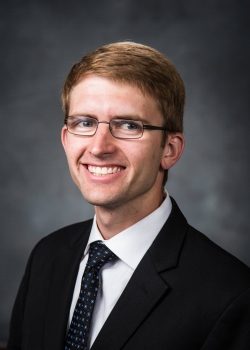Cultivating Success in a Supportive Environment
PROVO, Utah – Jun 22, 2020 – Whether he’s building planter boxes to prepare for his family’s garden projects or creating a community that stimulates learning in the classroom, Clark Pixton strives to create spaces for growth. Pixton, who teaches analytical reasoning as an assistant professor of global supply chain, works as a teacher and a researcher to teach strategies that ultimately allow students to help organizations to function more effectively.
While Pixton has found success in cultivating learning as a professor, he didn’t always anticipate that his analytical abilities would lead him to the front of the classroom. When Pixton began his education as an undergraduate student at BYU, he majored in math. “I knew that math would be a first step to other good things, but as an undergrad, I didn’t know which things I wanted to pursue,” he says.
Pixton’s research with BYU mathematics professor Robin Roundy first planted the seeds for his interest in business as he worked in operations research. “Operations research is basically applying heavy-duty math models to problems such as business problems,” says Pixton.
The focus of Pixton’s research is identifying ways that organizations can function more effectively. For example, Pixton has studied the effects of placement locations of different medications within a hospital and the effectiveness of the hospital overall. This interest in operations research and using math to solve business problems would eventually lead Pixton to earn his PhD and study and teach supply chain.
When Pixton was preparing to apply to graduate school, Roundy encouraged him to apply to some of the top schools in the country. Pixton would eventually be accepted into MIT’s Operations Research Center. “The research center at MIT is one of the oldest programs in operations research, and it's a strong interdisciplinary program,” he says. “The faculty come together from departments such as math, business, and civil engineering.”
The operations research Pixton completed at MIT further increased his abilities to use data and analytical tools as he worked with math and data to solve business problems. This background in analytics came in handy when he was asked to develop the supply chain analytics class at BYU Marriott after earning his PhD in 2018. The class teaches students how to use data tools to understand company operations, identify problems and areas for improvement, and communicate data-driven solutions.
Even though a semester class is not quite enough time to learn about every analytics tool that the students may encounter in the workplace, Pixton wants to help students learn strategies they can apply to any set of data. “I hope my students leave my class feeling empowered as learners in a quantitative space,” he says.
Because companies increasingly use data to drive their operations more efficiently, one of the most rewarding aspects of Pixton’s job has been seeing the fruits of his labors in the lives of students as they complete internships and begin working in the field. “At BYU, students recognize that analytics is an important skill set, and they want to learn as much as they can,” says Pixton. “I felt lucky to have an excited audience for the class that I started teaching, and I’ve seen students use what they’re learning in their work outside of class. Students say things like, ‘I used concepts that I learned in your class to save a company a lot of money during my internship,’ and that’s rewarding to hear.”
In addition to the opportunity to teach students important skills, Pixton also enjoys working in the supportive environment found at BYU Marriott. He recognized this environment even before he started teaching at the school during a visit to give a lecture. “When I was studying at MIT, I came to BYU Marriott to give a presentation,” he says. “One of the first questions I got was ‘How can we help you as you give this talk?’ There was a sense that people cared deeply and weren’t afraid to show that they cared about my success.”
Pixton hopes to add to this positive environment among students at BYU Marriott. “One of the things that I love the most about the GSCM program is that we work hard to have a family environment,” he says. “As professors, we focus on making a community that's going to stay with these students long after they graduate. I think that's valuable.”
Pixton works to cultivate a supportive environment in the GSCM program that he hopes will help students grow in their talents and abilities, allowing them to flourish and thrive in the companies and communities where they will ultimately plant their roots. “My goal is to help students be well-rounded and leave BYU Marriott ready to make a big difference,” he says.
Media Contact: Chad Little (801) 422-1512
Writer: Kenna Pierce





